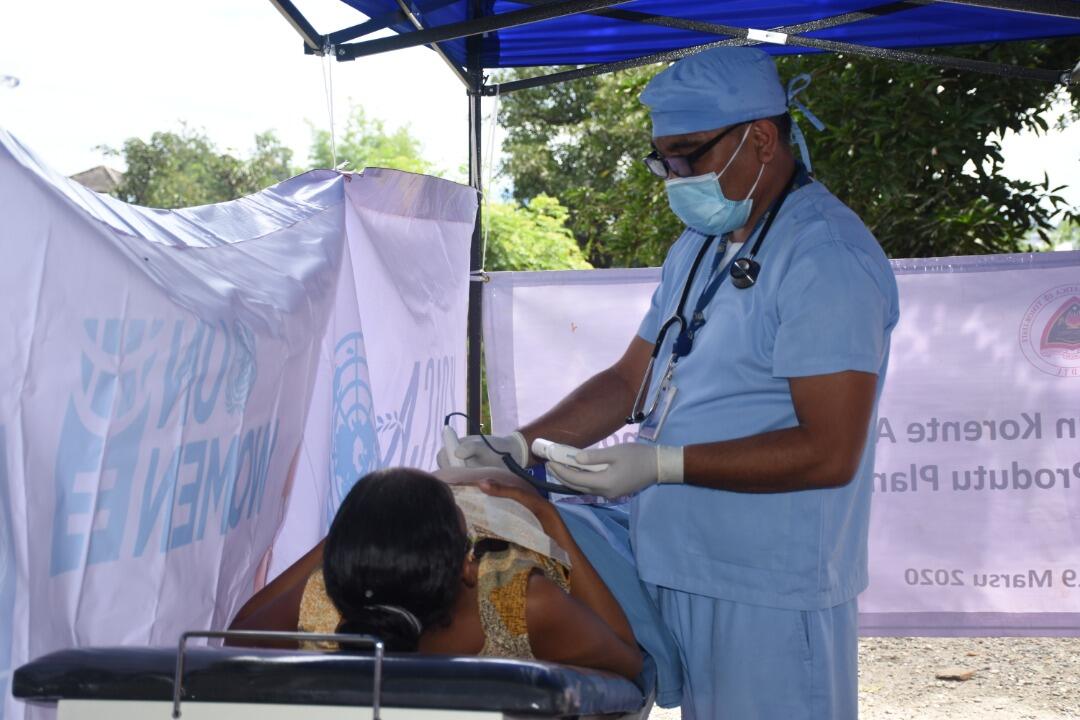DILI, May 3, 2021 –Timor-Leste President, H.E. Francisco Guterres Lú Olo renewed a 30-day State of Emergency last week to contain the spread of COVID-19, as the country rocovers from flash floods that affected more than 30,000 households in the island nation in April.
Over 40 people died in the disaster that has left thousands -- mostly women and children -- currently still displaced in evacuation centers accross the country.
“The shortage of midwives has made it more difficult. The available few midwives have to work for long hours in their respective community health centers with restricted movements due to lockdowns,” said Dr. José Antonio Gusmão Guterres, a gynaecologist and a midwifery trainer.
Midwives, many working in understaffed and poorly equiped facilites, are in the frontline saving precious lives while risking their own.
“In one community health center in Dili [Timor-Leste capital] four midwives were infected with COVID-19 virus. There are many more that are exposed everyday with no proper protective equipments. This has made health service delivery suffer even further in emergency situations when we conduct mobile maternity clinics with limited human resources,” said Dr. José Antonio.
Stella Amaral, a midwife from Bobonaro Municipality in Timor-Leste observes: “We lack necessary facilities and sufficient personal protective equipments (PPE’s) to protect us during delivery and caring of expectant mothers despite growing number of cases of COVID-19 in the municipalities which puts our lives and those of expectant mothers and babies at greater risk of contracting the virus.”
It is approximated that for every 100,000 births in Asia and the Pacific 150 women die from complications related to pregnancy which can be prevented if proper investment in midwives is prioritised.
Stark disparities exist within the region -- for every 100,000 births 220 women die in South Asia and 150 in South-East Asia, compared to 37 in East Asia.
While midwives could provide up to 90% of essential sexual, reproductive, maternal, newborn, and adolescent health care across the lifespan, there is a need-based shortage of 900,000 midwives globally.
Mr. Ronny Lindstrom, UNFPA Country Representative in Timor-Leste recognises the importance of data in improving health outcomes stating: “In collaboration with the Ministry of Health UNFPA is dedicated to building capacity of midwifery schools in Timor-Leste to provide high-quality pre-service midwifery education including training on the Minimum Initial Services Package (MISP) to mitigate effects of disasters like COVID-19 and to improve midwives’ working conditions through provision of state of the art facilities to midwifery schools.”
Midwives are fundamental in ending preventable deaths during and after childbirth and achieving Sustainable Development Goal (SDG) 3.1 – which aims to reduce global deaths due to complications from pregnacy and childbirths ratio to less than 70 per 100,000 live births by 2030.
This year’s IDM theme: “Follow the data: Invest in Midwives”, will concide with the launch of the State of the World’s Midwifery (SoWMy) Report 2021 co-led by United Nations Funds on Populations (UNFPA), World Health Organization (WHO), and International Confederation of Midwives (ICM).
According to a recent study by UNFPA, WHO, and ICM, investing in midwives is a cost-effective way of improving health outcomes.
Modest increase of 10% in midwife-delivered interventions every five years could save 22% maternal deaths, 23% newborn deaths and 14% stillbirths and save 1.3 million lives per year by 2035.
Likewise, increasing coverage of midwife-delivered interventions by 25% every five years could avert 2.2 million deaths per year while universal (95%) coverage could save up to 4.3 million deaths per year.
“Since 2015, UNFPA has supported the establishment of Maternal Death Surveillance and Response (MDSR) in collaboration with Governments and WHO to collect data, review maternal deaths, and identify the underlying causes to help prevent deaths of mothers and babies.
“Midwives trained in Emergency Obsteric and Newborn Care facilitated by UNFPA have played a key role in supporting maternal health services to the many pregnant women in COVID-19 isolation and providing mobile maternity clinics in evacuation centers that we support," said Mr. Ronny Lindstrom.
“Investing in midwives will ensure improved reproductive health, rights and choices for all.”
For more information contact:
Suleiman Okoth
Communications and Programme Support Specialist
United Nations Population Fund (UNFPA), Timor-Leste
UN House, Caicoli Street
Dili, Timor-Leste
Mobile: +670 75169796
WhatsApp: +254 780534026
Email; okoth@unfpa.org


